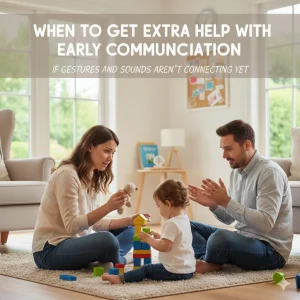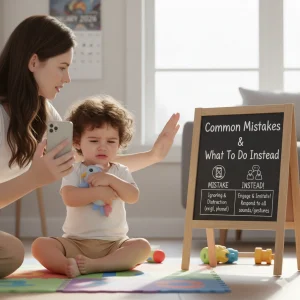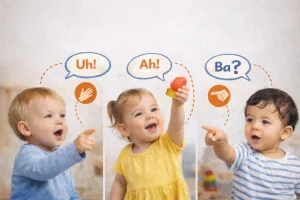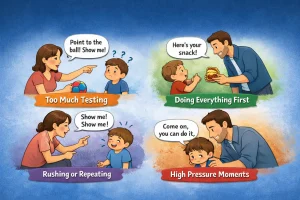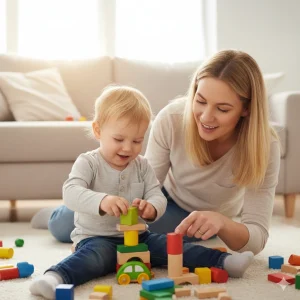Toddler Grammar Struggles: When Mistakes Might Mean More
By Rajini D
Last Updated: August 5, 2025
“My toddler keeps saying ‘me want toy’ instead of ‘I want the toy’ — should I be worried?” Sound familiar? For many parents, toddler grammar mistakes are brushed off as “cute” or just part of growing up. But what if those little errors are more than just developmental quirks? What if they’re early signs of a toddler grammar delay, a language disorder, or even an early indicator of autism?
Grammar is a crucial part of your child’s language development — and knowing when toddlers learn grammar, and what mistakes are normal, can help you identify whether your child is just taking their time… or needs extra support.
Free Speech Help for Kids
Concerned about speech delays? Book a free consultation with our expert speech therapist and get guidance tailored to your child’s needs.
When Do Toddlers Start Using Grammar?
Grammar might sound like something reserved for school-aged kids, but toddlers actually begin using the building blocks of grammar much earlier than most parents realize. As your little one starts combining words and expressing thoughts, they’re already taking their first steps into the world of grammar.
Age-Appropriate Grammar Milestones
So, when do toddlers learn grammar? Typically, children begin experimenting with grammar between 18 and 24 months of age. During this stage, most toddlers start forming two-word combinations like “want toy,” “go park,” or “mama help.” While these phrases may seem basic, they represent the early use of syntax—the rules that guide sentence structure.
By age two, many toddlers will progress from using single words to stringing together simple two- or three-word sentences. This is when early grammar skills start to emerge, such as:
- Adding plural forms (e.g., dogs instead of dog)
- Using verb endings (e.g., running vs. run)
- Starting to grasp pronouns (e.g., I, me, you)
However, it’s important to remember that language development varies from child to child. Some toddlers might use clear, structured phrases by their second birthday, while others may still rely on one-word demands or gestures.
What If My Toddler Isn’t Speaking in Sentences?
If your toddler is not speaking in sentences by 24–30 months, it may be time to take a closer look at their language development. Occasional grammar mistakes are normal—but if your child is still not combining words, struggles to make simple requests, or only uses a limited vocabulary, it could point to a grammar delay or broader speech and language delay.
In such cases, early intervention can make a big difference. Tools like a speech therapy app for toddlers or guidance from a speech-language pathologist (SLP) can help your child catch up and thrive.
Also read: Toddler Speech Development: From Babbling to First Words
Common Grammar Mistakes in Toddlers
As toddlers begin forming sentences, grammar doesn’t come out perfectly—and that’s okay! Making grammar mistakes is a normal part of language development. In fact, these slip-ups are often a sign that your child is trying to grasp the complex rules of communication.
But how do you know if your toddler’s grammar mistakes are part of normal development—or signs of something more, like a toddler grammar delay?
Here’s a breakdown of typical toddler grammar mistakes and what to look out for:
Common Grammar Mistakes (What’s Normal)
| Mistake Type | Example | Normal or Concerning? |
|---|---|---|
| Missing words | “Me want toy” instead of “I want the toy” | Normal at 18–24 months as toddlers simplify sentences |
| Verb tense errors | “He goed to park” instead of “He went to the park” | Very common – shows attempt to apply grammar rules |
| Incomplete sentences | “More milk” or “Dog bark” | Typical in early stages; toddlers often skip small words |
| Pronoun confusion | “You help me” instead of “I help you” | Expected—pronouns are tricky and often reversed |
These examples are part of how toddlers test out grammar as they go from learning words to structuring thoughts. It’s messy—but meaningful.
When Grammar Mistakes Might Signal a Delay
Occasional mix-ups are fine, but consistent or persistent issues may suggest a toddler grammar delay, especially if your child:
- Rarely combines words by age 2.5
- Still speaks mostly in one-word phrases after 30 months
- Omits important parts of speech in nearly every sentence
- Struggles to build longer sentences even after age 3
If these sound familiar, your toddler might benefit from extra support—like working with a speech therapist or using a speech therapy app for toddlers that targets grammar and sentence-building.
When Grammar Mistakes Might Mean a Language Delay
Not all grammar struggles are created equal. While most toddlers make adorable mistakes as they learn to talk, there are times when these errors point to something deeper—like a speech or language delay. So, how can parents tell the difference between a child who’s just taking their time and one who may need extra help?
Early Signs of a Language Delay in Toddlers
Every child develops at their own pace, but there are certain red flags that may indicate your toddler isn’t just a “late talker.” Here are some common signs of language delay in toddlers to watch for:
- Limited vocabulary by 18–24 months
(e.g., not using at least 20–50 words by age 2) - Not forming simple sentences by age 2.5
(e.g., still saying single words like “milk” instead of “want milk”) - Difficulty combining words even after exposure and modeling
- Lack of progress over time or sudden regression in language use
- Struggles with basic grammar rules even by age 3
(e.g., missing subject-verb structure: “Want toy” instead of “I want toy”)
If your toddler is not forming correct sentences consistently past the age when most kids do, it may be more than a delay—it could signal a language disorder or even an early sign of developmental conditions like autism.
Also read: Is Your 3-Year-Old Talking Late?- Help for Speech Delay
Late Bloomer or Language Delay?
It’s important to note: not every toddler who talks late has a problem. Some are late bloomers—kids who may start speaking later than peers but catch up on their own without intervention.
Here’s a quick comparison:
| Late Bloomer | Language Delay |
|---|---|
| Uses gestures to communicate | Rarely gestures or tries to express needs |
| Gradually adds new words | Very slow or no progress in vocabulary |
| Begins combining words by 30 months | Still uses mostly one-word phrases |
| Understands more than they can say | May struggle with both understanding and speaking |
If your child understands language well but struggles to express it, they may be a late bloomer. But if they show multiple signs of language delay in toddlers, it’s best not to wait and see.
Expert Tip: The earlier you identify a possible delay, the easier it is to help your child build strong communication skills—before it affects learning or social development.
Next Steps for Concerned Parents
If your toddler is not forming correct sentences, or you’re noticing consistent delays, consider:
- Scheduling a speech-language screening
- Trying a speech therapy app for toddlers to support grammar skills at home
- Consulting with a pediatrician or early intervention specialist
Early action leads to better outcomes—and often, children who receive the right support early on catch up and thrive.
Could Grammar Issues Signal Autism?
It’s natural to wonder: Is grammar delay a sign of autism? While many toddlers make grammar mistakes as they learn to speak, persistent language and grammar delays—especially when combined with social challenges—can sometimes be early indicators of autism spectrum disorder (ASD).
Autism affects more than just speech. It impacts how a child communicates, interacts socially, and processes language. So if your toddler is struggling to form correct sentences and also showing signs of social difficulty, it may be worth exploring further.
How Grammar and Language Delays Relate to Autism
Children with autism often develop language differently from their peers. Instead of gradually building up from single words to full sentences, they may:
- Repeat phrases word-for-word (echolalia) without understanding their meaning
- Leave out key grammar parts (e.g., “Want go park” instead of “I want to go to the park”)
- Avoid using pronouns correctly (e.g., referring to themselves as “you” or using their own name)
- Struggle to ask questions or describe things clearly
These aren’t just toddler grammar mistakes—they can be part of a broader delay in how language is processed and used for communication.
Early Signs of Autism Beyond Speech
While grammar issues may raise flags, they rarely appear in isolation. It’s important to consider other early signs of autism language and behavior, such as:
- Limited eye contact or facial expressions
- Lack of response to name or simple instructions
- Little interest in playing with others
- Prefers routines and struggles with change
- Uses objects in repetitive or unusual ways (e.g., lining up toys)
When these signs occur alongside grammar or language delays, they could point to autism—not just a simple speech issue.
When to Get an Evaluation
Not all children with grammar delays have autism, but combining signs like poor sentence formation, social withdrawal, and repetitive behaviors is a strong reason to seek a professional evaluation. A pediatrician or child development specialist may refer you to:
- A speech-language pathologist (SLP)
- A developmental pediatrician
- An autism diagnostic team for further assessment
Some parents also benefit from using an autism app for toddlers or a speech therapy app that includes autism-friendly tools and progress tracking.
Parent Reflection: “We thought our son’s broken sentences were just late talking. But when we noticed he avoided eye contact and didn’t play with others, we talked to a specialist—and it helped us catch autism early.”
What Parents Can Do at Home
You don’t need to be a speech therapist to help your toddler at home to grow stronger in language and grammar. In fact, home-based support—when done consistently and playfully—can have a huge impact on your child’s development. If you’re noticing small grammar hiccups or simply want to boost your toddler’s language skills, there are plenty of fun and simple ways to help right at home.
Simple Activities to Improve Toddler Grammar
Building grammar doesn’t require drills or flashcards alone. The key is interactive play and everyday conversations. Here are a few proven activities to improve toddler grammar naturally:
1. Narrate Your Day
Talk through actions while doing them:
“I am cutting the apple. Now I’m putting it on the plate.”
This helps toddlers hear full sentences and understand how words are structured.
2. Use Flashcards with Verbs & Pronouns
Instead of only naming objects, use flashcards that include action words and people:
- “She is jumping.”
- “He is eating.”
- “I am running.”
Encourage your toddler to repeat or fill in the blanks to model sentence structure.
3. Picture Books with Repetitive Sentences
Choose books that use clear, repetitive grammar structures like:
- “Brown Bear, Brown Bear, What Do You See?”
- “The Very Hungry Caterpillar”
Ask questions after each page to reinforce grammar:
“What did he eat?” “What did she do next?”
4. Play-Based Sentence Building
Use toys (like dolls, cars, or animals) to model actions:
- “The dog is running.”
- “The girl is brushing her hair.”
Then, encourage your toddler to describe what they see using complete phrases.
5. Sing Songs with Full Sentences
Songs with rich language and full sentences (e.g., Wheels on the Bus, Old MacDonald) naturally support sentence formation and grammar patterns.
Use Tools that Support Grammar at Home
Today, many parents turn to speech therapy apps for toddlers that offer interactive grammar games and progress tracking. Some apps allow you to focus on sentence-building, verb usage, and even early pronoun understanding, all through playful design.
You can also explore printable resources and video-based activities specifically designed for grammar development—some of which we offer here on Wellness Hub.
Digital Help: Best Speech Therapy and Autism App (BASICS App)
In today’s digital world, the right tools can make a big difference in how toddlers learn to speak and form sentences. If your child is showing signs of a speech delay, struggling with grammar, or needs support related to autism, using the right app at home can be a game-changer.
One of the most trusted tools for parents today is the BASICS App by Wellness Hub—a therapist-designed platform that’s already helping thousands of children with early language challenges.
Why Choose the BASICS App?
Whether your child is working through grammar delays, just starting to combine words, or showing early signs of autism language delay, the BASICS App is designed with parents in mind. Here’s how it helps:
- Targets speech delay and grammar development through play-based learning
- Includes therapist-guided activities to improve toddler grammar
- Offers visual supports for children with autism or mixed receptive-expressive delays
- Designed as an easy-to-use speech therapy app for toddlers at home
- Tracks your child’s language progress in real time
From early first words to pronouns, sentence-building, and grammar correction, BASICS helps bridge the gap between home and therapy.
Bonus: Autism Support Included
The BASICS App is not just for speech—it’s also a reliable autism app for toddlers, featuring:
- Visual routines and picture cues
- Early social skills activities
- Language-building tasks tailored for neurodiverse learners
- Therapist-selected content to fit your child’s level
Whether you’re just starting to notice delays or already working with a therapist, BASICS complements your efforts with screen-time that’s both purposeful and professional.
Parent Tip: Consistency matters. Just 10–15 minutes a day with a tool like BASICS app can lead to noticeable improvement in your child’s grammar and language use.
When to Seek Professional Help
It’s completely normal for parents to feel unsure about when to step in. After all, every toddler learns and speaks at their own pace. But if you’ve been noticing consistent grammar struggles, limited word use, or your child just isn’t progressing like other kids their age, it may be time to consult a professional.
When to Talk to a Speech-Language Pathologist (SLP)
If your child is approaching age 2 or older and you’re seeing persistent toddler grammar delay symptoms, don’t wait for it to “fix itself.” A speech-language pathologist (SLP) is a trained expert in identifying and treating speech, language, and communication issues in young children.
Here are a few signs that it’s time to schedule a consultation:
- Your toddler is not forming correct sentences or combining two or more words regularly after 2.5 years
- Frequent grammar mistakes like leaving out words, misusing pronouns, or skipping verbs, with little progress
- Your child has trouble being understood, even by close family
- They get frustrated when trying to speak, or avoid talking altogether
- You suspect a developmental delay, autism, or hearing issue
In these cases, getting a professional opinion early can prevent bigger challenges down the road.
What an SLP Will Evaluate
An SLP doesn’t just look at how many words your toddler says—they assess how your child puts words together, how they understand language, and how they use grammar to express themselves.
Their evaluation may include:
- Observing how your child responds to questions or instructions
- Checking sentence length and grammar structure
- Analyzing pronoun use, verb tenses, and sentence formation
- Looking for signs of speech therapy for grammar delay
SLPs may also screen for cognitive, hearing, or social delays that impact communication.
Using Online Speech Therapy for Kids
If you’re not near a clinic or prefer home-based options, online speech therapy for kids is now more accessible than ever. Virtual sessions through platforms like Tele-BASICS allow you to connect with licensed therapists and receive:
- Personalized grammar and language strategies
- Video-based activities tailored to your child’s needs
- Progress monitoring and parent coaching
- Printable home practice tools
It’s an ideal solution for busy families or those seeking early intervention in a familiar environment.
Real Parent Insight: “We thought our son’s short phrases were normal. But when he wasn’t improving by age 3, we started speech therapy. Within a few sessions, we saw him using full sentences!”
The Sooner, The Better
If your gut says something isn’t right, trust it. Early support from a speech-language pathologist—whether in-person or online—can make all the difference in helping your child catch up and thrive.
Remember: speech therapy for grammar delay is most effective when started early, while the brain is still rapidly developing.
Conclusion
Toddler grammar mistakes are often part of normal development, but knowing when those errors cross into delay territory is essential. If your child isn’t forming correct sentences, struggles with pronouns or verbs, or shows signs of broader communication challenges, it’s worth paying attention. Early intervention—through speech therapy, expert guidance, or tools like the BASICS App—can help your child develop strong grammar skills and prevent long-term difficulties. Don’t wait and wonder. With the right support, your toddler can thrive in both language and confidence.
Frequently Asked Questions:
1. Is it normal for toddlers to make grammar mistakes?
Yes, it’s very normal. Toddlers often say things like “Me want toy” or “He goed home.” These toddler grammar mistakes show they’re learning how to use words. But if these mistakes continue past age 3 without progress, it could be a sign of a grammar delay.
2. When do toddlers usually start using grammar correctly?
Most toddlers begin using simple grammar around 18–24 months. You might hear them say short phrases like “Want juice” or “Go outside.” By age 2.5 to 3, many start forming fuller sentences.
3. How can I tell if my toddler has a grammar delay?
Look for signs like not combining words, using very few verbs, or not forming correct sentences by age 2.5 to 3. If your child often leaves out important words and doesn’t improve over time, it may be a toddler grammar delay.
4. Can grammar delay mean something more serious?
Sometimes, yes. Is grammar delay a sign of autism? It can be—especially if your child also avoids eye contact, doesn’t respond to their name, or has social challenges. It’s best to talk to a professional if you’re unsure.
5. What are the early signs of language delay in toddlers?
Early signs include:
- Not speaking in two-word phrases by age 2
- Very limited vocabulary
- Trouble being understood
- Not forming correct sentences
- Lack of interest in talking or pointing
6. Can I help my child with grammar at home?
Yes! Use activities to improve toddler grammar like reading picture books, singing songs with full sentences, and using toys to model simple phrases. Narrating daily routines also helps build language naturally.
7. Are there any good speech therapy apps for toddlers?
Yes, there are several. Tele-BASICS, Speech Blubs, and Otsimo are great options. They offer fun games, flashcards, and activities that support grammar and language development at home.
8. When should I take my child to a speech therapist?
If your toddler is 2.5 years or older and still not forming sentences, misuses grammar often, or seems frustrated when trying to speak, it’s a good idea to consult a speech-language pathologist (SLP).
9. What does a speech therapist do for grammar delay?
An SLP will assess how your child speaks and understands language. They may work on sentence-building, pronoun use, verb tenses, and more. They also guide parents with tips and home activities.
10. Can online speech therapy help with grammar delay?
Yes! Online speech therapy for kids offers video sessions, progress tracking, and expert support right from home. It’s helpful for busy families or those starting early support with tools like Tele-BASICS.
About the Author:
Rajini Darugupally
M.Sc., Speech-Language Pathologist (9+ years of experience)
Rajini is a passionate and dedicated Speech-Language Pathologist with over 9+ years of experience, specializing in both developmental speech and language disorders in children and rehabilitation in adults. Driven by a desire to empower each individual to find their voice, Rajini brings a wealth of experience and a warm, genuine approach to therapy. Currently, at Wellness Hub, she thrives in a team environment that values innovation, compassion, and achieving results for their clients.
Book your Free Consultation Today
Parent/Caregiver Info:
Client’s Details:
* Error Message
